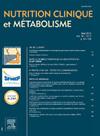约旦大学生的直觉性饮食行为
IF 0.4
4区 医学
Q4 ENDOCRINOLOGY & METABOLISM
引用次数: 0
摘要
直观饮食是一种饮食模式,可以被表达为保持人体与其内部饥饿/饱腹感信号之间的牢固联系。当涉及到食物选择时,这种方法使我们能够理解和倾听我们的身体,并改善饮食行为。目的确定约旦大学生的直观饮食得分。MethodsCross-sectional调查;目标是约旦(公立和私立)大学的学生。直觉性饮食采用“23项直觉性饮食量表-2”(IES-2)进行测量。IES-2计算受访者在选择他们将吃的食物时信任身体内部饥饿/饱腹感信号的能力,以确定他们的直觉饮食(IE)得分。学生们通过对每个项目的调查来确定最能描述他们饮食态度或行为的最佳答案。结果共有431名学生来自约旦公立和私立大学。两组的直观饮食量表(IES)得分均为中性。男性和女性在IES-2中的得分都不高于4分。但是,男性的得分高于女性,因为女性的得分为3.5分,而男性的得分为3.67分。结论所有男性和女性受访者的IES总分均为中性。直觉性饮食是否会影响体重控制行为和体重指数,还需要更多的研究来证实。直觉饮食行为可能是传统饮食更好、更健康的选择。凭直觉吃东西的人会对食物与自己建立更强的联系。本文章由计算机程序翻译,如有差异,请以英文原文为准。
Intuitive eating behaviors among Jordanian universities’ students
Background
Intuitive eating is the kind of eating pattern could be expressed as keeping a solid link between human body and its inside signs for hunger/satiety. This approach allows us to understand and listen to our body when it comes to food choices and improves eating behaviours.
Aim
To determine the intuitive eating score among students of Jordanian universities.
Methods
Cross-sectional survey; targets students in Jordanian (public & private) universities. Intuitive eating was measured by the “twenty-three-item Intuitive-Eating Scale-2”, (IES-2). IES-2 counts the respondents’ capability to trust body's inside hunger/satiety signals while choosing the food items they will eat to determine their intuitive eating (IE) score. The students were informed through a survey on every item to determine the best answer that best describes their eating attitudes or behaviours.
Results
There were 431 students from Jordanian public and private universities. Both groups’ Intuitive Eating Scale (IES) scores were neutral. Neither males nor females scored higher than four on the IES-2. However, male respondents’ results indicated a higher score than female respondents’ since female respondents’ results had a 3.5 score while males had a 3.67 score.
Conclusions
The results showed that all male and female respondents indicated a neutral total IES score. More studies are needed to discover if intuitive eating influences weight control behaviours and body mass index. Intuitive eating behaviour may be a better and healthier alternative to traditional diets. Individuals who eat intuitively build a stronger connection with themselves towards food.
求助全文
通过发布文献求助,成功后即可免费获取论文全文。
去求助
来源期刊

Nutrition Clinique et Metabolisme
医学-内分泌学与代谢
CiteScore
0.80
自引率
16.70%
发文量
216
审稿时长
78 days
期刊介绍:
Nutrition Clinique et Métabolisme is the journal of the French-speaking Society of Enteral and Parenteral Nutrition. Associating clinicians, biologists, pharmacists, and fundamentalists, the articles presented in the journal concern man and animals, and deal with organs and cells. The goal is a better understanding of the effects of artificial nutrition and human metabolism. Original articles, general reviews, update articles, technical notes and communications are published, as well as editorials and case reports.
 求助内容:
求助内容: 应助结果提醒方式:
应助结果提醒方式:


